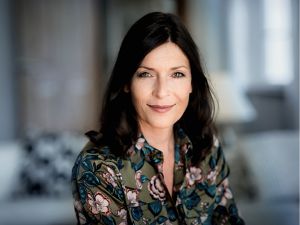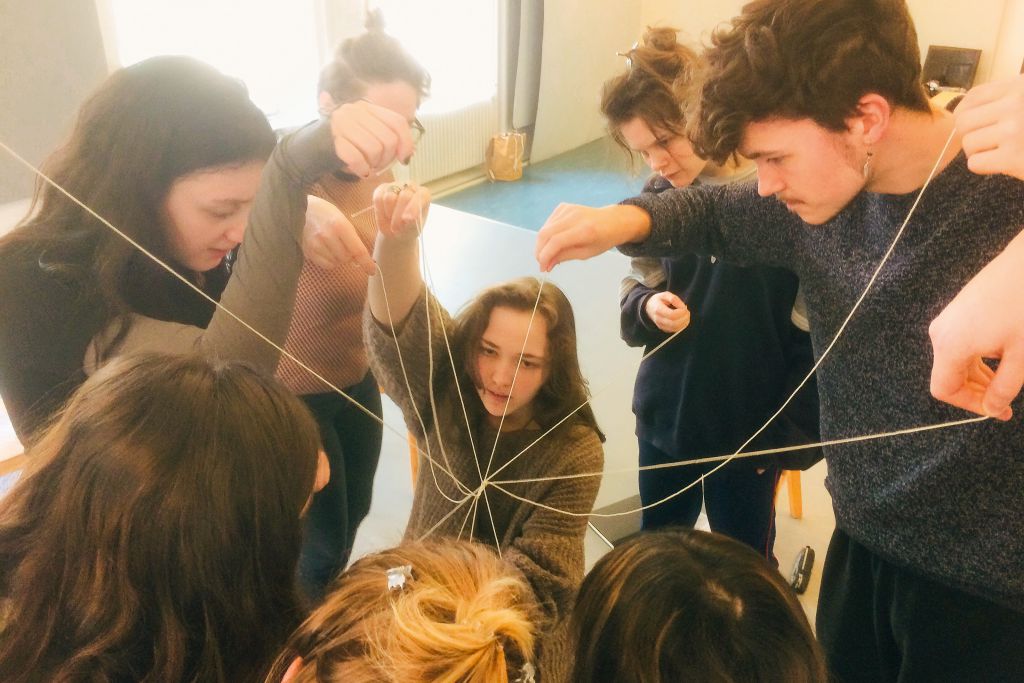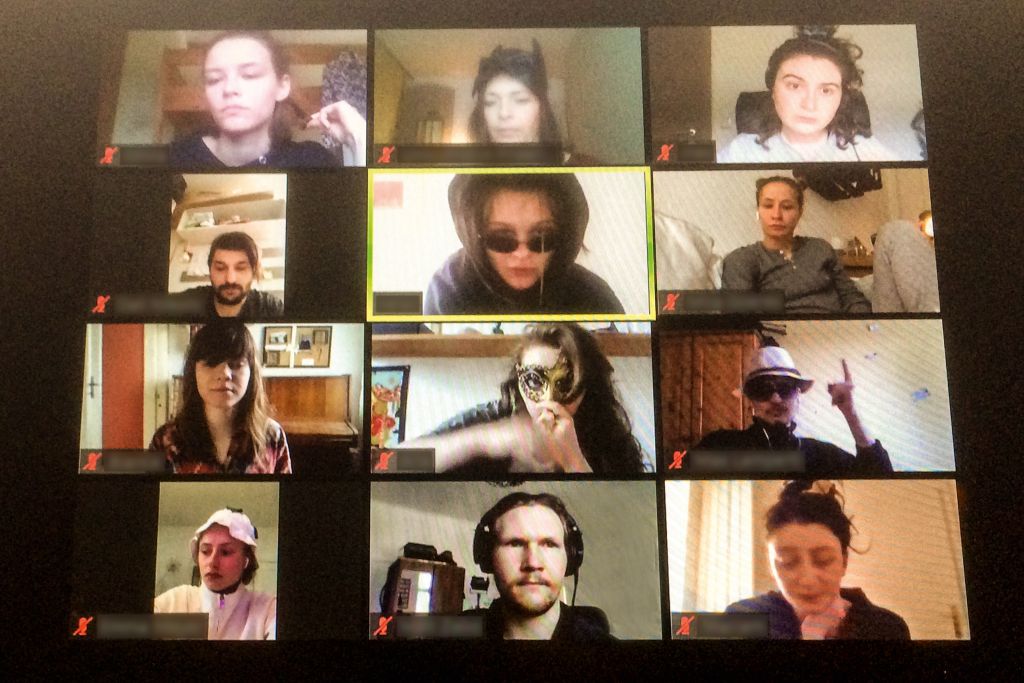Learning from Friderikke-Maria Hörbe at the Max Reinhardt Seminar
Friderikke-Maria Hörbe has been a professor of ensemble work and role development at the Max Reinhardt Seminar since March 2020. She recently spoke with mdw Magazine about her teaching work and about how she came to acting.
The 2nd-semester subject Rollengestaltung für Ensemblearbeit [Role Development for Ensemble Work] revolves around acting opposite partners and in ensembles, with students learning improvisational techniques. “We get inspired by everyday situations, by paintings, photos, articles, films, and plays, and we use this inspiration to work up improvised scenes. In doing so, we employ repetition so as to concentrate the actions and texts and intensify conflicts,” explains Hörbe. Improvisation is also about encouraging spontaneity and the joy of acting as such, and to illustrate this, the acting professor Hörbe provides the example of a prepared exercise from class: “The students tell a story together with each student contributing a single word one after the other in a set order and rhythm. It only works if everyone reacts spontaneously to what was said just before. This gives rise to wild stories that emerge directly from the unconscious.”

For acting students from the third semester onward, Rollengestaltung entails playfully working up staged versions of texts or entire scenes from classic works, plays from antiquity, and contemporary drama. “We start by reading and analysing a text in order to filter out the essence of a situation, the characters’ goals and points of resistance, before the students play the scene,” says Hörbe. “Acting is above all reacting. It’s about being in the moment. While a scene will ultimately bring a character to a certain destination, each move can change depending on the actions of one’s opposite. So the exact route to that destination remains open! It’s important that students practice working with and internalise this principle,” she says. Various exercises and techniques are employed to help students give up their self-control and pay attention to their opposites in order to react spontaneously yet within their characters’ own logics. And Hörbe, in her teaching, puts special emphasis on enabling students to abandon their fears: “I find it important to employ a motivating, supportive approach in the interest of providing a fear-free space where trust and creativity can arise.”
Young actors are faced with complex, constantly changing demands in their professional lives—and it’s the fundamental skills of the trade that provide the foundation for dealing with them. “Concrete acting skills are important above all when things get tough because they give you something to fall back on,” says Hörbe. But development into a full-fledged artistic personality is just as central to the actors’ training: “At the end of one’s studies, the skill needed to play anything is not the sole criterion when it comes to artistic quality; it’s also about whether someone embodies a fascinating personality with their own visions who’s capable of captivating an audience.” Another important point is to reinforce her students’ social skills throughout their studies. “Stage and film work is for the most part teamwork. But it also requires a healthy sort of egotism as well as radicalism as an artist, and combining these qualities takes a good measure of social competence,” Hörbe emphasises.
One of the defining features of the Max Reinhardt Seminar’s programmes is that directing and acting students go through a shared phase of identical basic training during the first two semesters. Hörbe sees considerable advantages in this: “Collaboration between the leading team and the actors embodies the core of theatrical work. And this early contact gives acting and directing students a chance to exchange perspectives—learning from each other while developing a deep understanding of and for one another. Reinforcing the idea of the ensemble is the foundation of good acting,” concludes Hörbe.

The COVID-19 mitigation measures currently in effect represent a challenge in terms of anything that involves physical proximity and all of the senses. But Hörbe and her students try to concentrate on possibilities rather than impossibilities. Acting things out together via online conferences has comes to feel more normal over time, Hörbe works with students on monologues in individual lessons, and the group streams videos of plays together with subsequent analysis. She says she’s optimistic: “The current restrictions, which simply will need to be in place for a certain time, may engender new creativity and powers we can’t yet even imagine. So perhaps it’ll only be later on that we’ll sense how much this experience has actually given us—even if it’s just a boundless desire to once again do some honest-to-goodness acting together!”
It was as a child that Friderikke-Maria Hörbe became possessed by a desire to act. She was born in 1971 and grew up in a small Thuringian village—and despite the fact that her childhood included zero experience with cinema or theatres, nor with television (her family didn’t own one), she did feel an urge to imitate people. “I concentrated on imitating the people in my village, like the pastor and all the teachers. I even played my deceased grandfather as he appeared at his viewing, surrounded by flowers, because I found his dignified appearance so fascinating. Back then, people kept telling me, ‘You’ve should go into acting!’” she recalls. “I have no idea whether it was the desire to become an actor or my belief in this prophecy that was there first. But when coincidence brought me together with a famous acting couple who told me I had talent, my goal became clear: I wanted to take the stage!”

Hörbe went on to study acting at what is now the Konrad Wolf Film University of Babelsberg. Her initial work involved guest appearances at various theatres in Germany as well as various film engagements. She then spent several years as an ensemble member with Schauspiel Leipzig, as part of which she played numerous lead roles and worked with directors including Michael Thalheimer, Karin Henkel, Johanna Schall, and Wolfgang Engel. Her teaching activities have since taken her to numerous renowned places of dramatic training in the German-speaking region, and she also regularly coaches actors as they prepare specific roles. Friderikke-Maria Hörbe’s professorship at the Max Reinhardt Seminar thus marks the latest milestone in what is already an impressive career.

